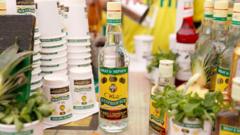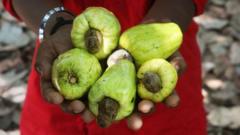Key stakeholders are at odds over geographical indications and the future of rum production on the island.
**What Defines Jamaican Rum? Ongoing Legal Dispute Over Its Identity**

**What Defines Jamaican Rum? Ongoing Legal Dispute Over Its Identity**
A contentious debate in Jamaica over the true identity of Jamaican rum is challenging the future of the industry.
Rum has long been synonymous with Jamaica's cultural heritage, but a legal confrontation is raising questions about what qualifies as “Jamaica rum.” At the heart of this dispute is a move by the Spirits Pool Association (SPA)—representing various Jamaican distilleries—to tighten regulations on the geographical indication (GI) for rum produced on the island. This initiative arises from amendments authorized by the Jamaica Intellectual Property Office (JIPO) last October, which includes a ban on aging Jamaican rum overseas.
The SPA contends that a stringent GI is necessary for better recognition and protection of Jamaican rum in pivotal markets like the EU and the US. They believe this change would prevent dilution of the brand and enhance consumer acknowledgment of the rum as a premium product thoughtfully crafted in its place of origin. The six distilleries affected include notable names such as Appleton Estate and Hampden Estate.
However, not all producers are on board with the proposed changes. National Rums of Jamaica (NRJ), which owns Long Pond and a substantial portion of Clarendon, has expressed that the amendments threaten its operations. The company, which has ties to several international stakeholders, including French firm Maison Ferrand, makes its business model dependent on exporting rum in bulk for aging outside Jamaica, a practice now deemed unacceptable under the revised rules.
The crux of the NRJ’s position asserts that rum that is produced in Jamaica, regardless of aging location, should still qualify as Jamaican rum—reflecting practices that have been in place for generations. Furthermore, they argue that the latest regulations disproportionately impact their business strategy, particularly following the acquisition of Wird by Maison Ferrand in 2017, after which the tensions regarding the GI escalated.
Advocates for the stricter GI regulations, including Christopher Gentles, the SPA's general manager, emphasize the importance of authentic aging in Jamaica. He asserts that exporting and aging rum elsewhere detracts from its authenticity and damages Jamaica’s economic benefits linked to the full rum production process, from aging to distribution.
In the broader context of rum production across the Caribbean, similar issues are surfacing in Barbados, where the local distilleries are voicing concerns about geographical indications and the threat posed by bulk aging overseas. The situation underscores the need for sustained intrinsic industries tied firmly to their regions, echoing sentiments expressed by Richard Seale from Foursquare distillery in Barbados.
As Jamaica’s rum industry navigates these complexities, the SPA is advocating for the pursuit of EU's Protected Geographical Indication status. This would solidify Jamaican rum's standing in the international market, pending resolution of the ongoing disputes at JIPO. While stakeholders remain hopeful for compromise, the ultimate goal transcends economic benefits; it reflects a profound respect and pride for a product woven into the fabric of Jamaica’s heritage. Local media have echoed this sentiment, recognizing the urgency to defend the integrity of Jamaican rum amidst increasing global competition and foreign ownership claims.
The SPA contends that a stringent GI is necessary for better recognition and protection of Jamaican rum in pivotal markets like the EU and the US. They believe this change would prevent dilution of the brand and enhance consumer acknowledgment of the rum as a premium product thoughtfully crafted in its place of origin. The six distilleries affected include notable names such as Appleton Estate and Hampden Estate.
However, not all producers are on board with the proposed changes. National Rums of Jamaica (NRJ), which owns Long Pond and a substantial portion of Clarendon, has expressed that the amendments threaten its operations. The company, which has ties to several international stakeholders, including French firm Maison Ferrand, makes its business model dependent on exporting rum in bulk for aging outside Jamaica, a practice now deemed unacceptable under the revised rules.
The crux of the NRJ’s position asserts that rum that is produced in Jamaica, regardless of aging location, should still qualify as Jamaican rum—reflecting practices that have been in place for generations. Furthermore, they argue that the latest regulations disproportionately impact their business strategy, particularly following the acquisition of Wird by Maison Ferrand in 2017, after which the tensions regarding the GI escalated.
Advocates for the stricter GI regulations, including Christopher Gentles, the SPA's general manager, emphasize the importance of authentic aging in Jamaica. He asserts that exporting and aging rum elsewhere detracts from its authenticity and damages Jamaica’s economic benefits linked to the full rum production process, from aging to distribution.
In the broader context of rum production across the Caribbean, similar issues are surfacing in Barbados, where the local distilleries are voicing concerns about geographical indications and the threat posed by bulk aging overseas. The situation underscores the need for sustained intrinsic industries tied firmly to their regions, echoing sentiments expressed by Richard Seale from Foursquare distillery in Barbados.
As Jamaica’s rum industry navigates these complexities, the SPA is advocating for the pursuit of EU's Protected Geographical Indication status. This would solidify Jamaican rum's standing in the international market, pending resolution of the ongoing disputes at JIPO. While stakeholders remain hopeful for compromise, the ultimate goal transcends economic benefits; it reflects a profound respect and pride for a product woven into the fabric of Jamaica’s heritage. Local media have echoed this sentiment, recognizing the urgency to defend the integrity of Jamaican rum amidst increasing global competition and foreign ownership claims.














